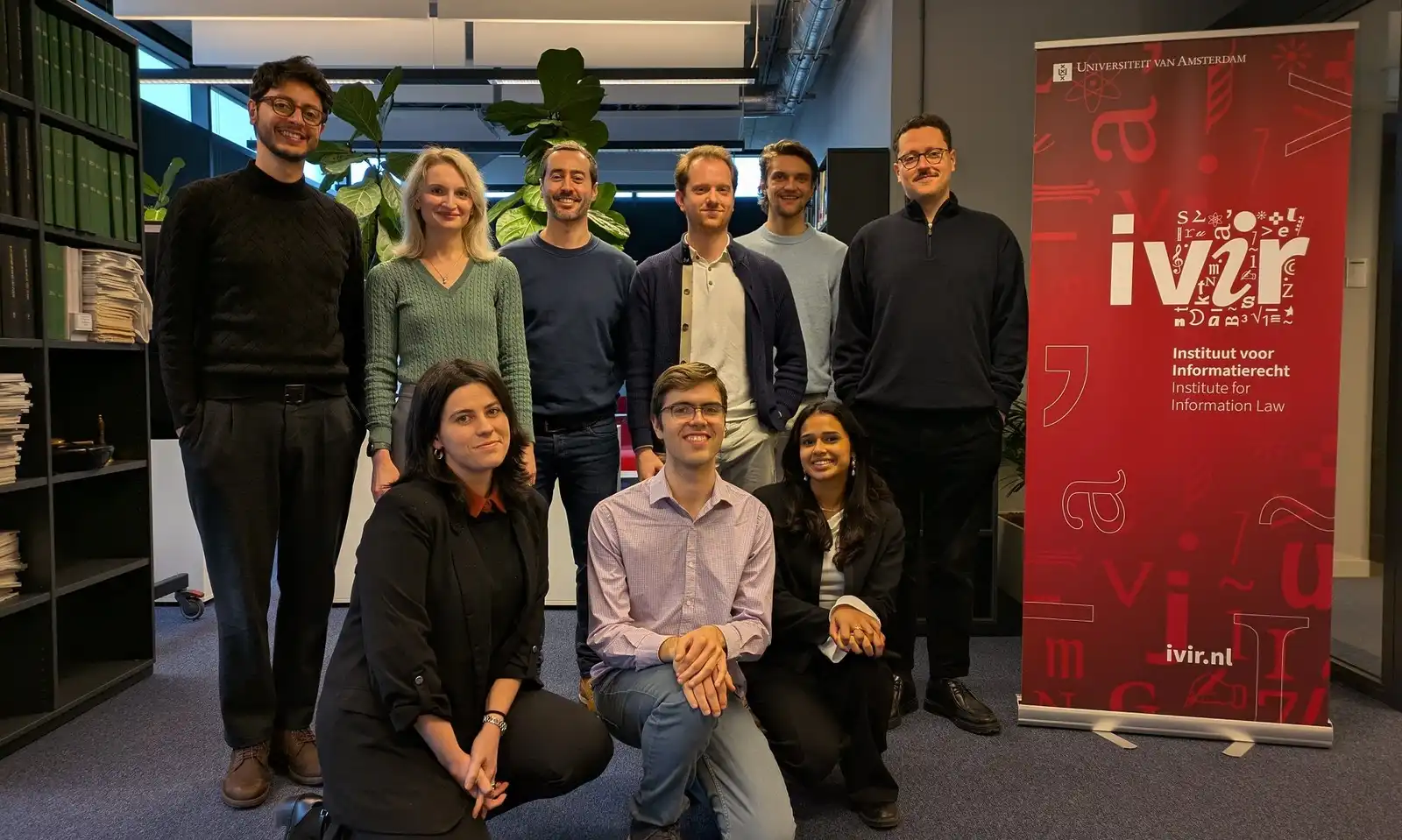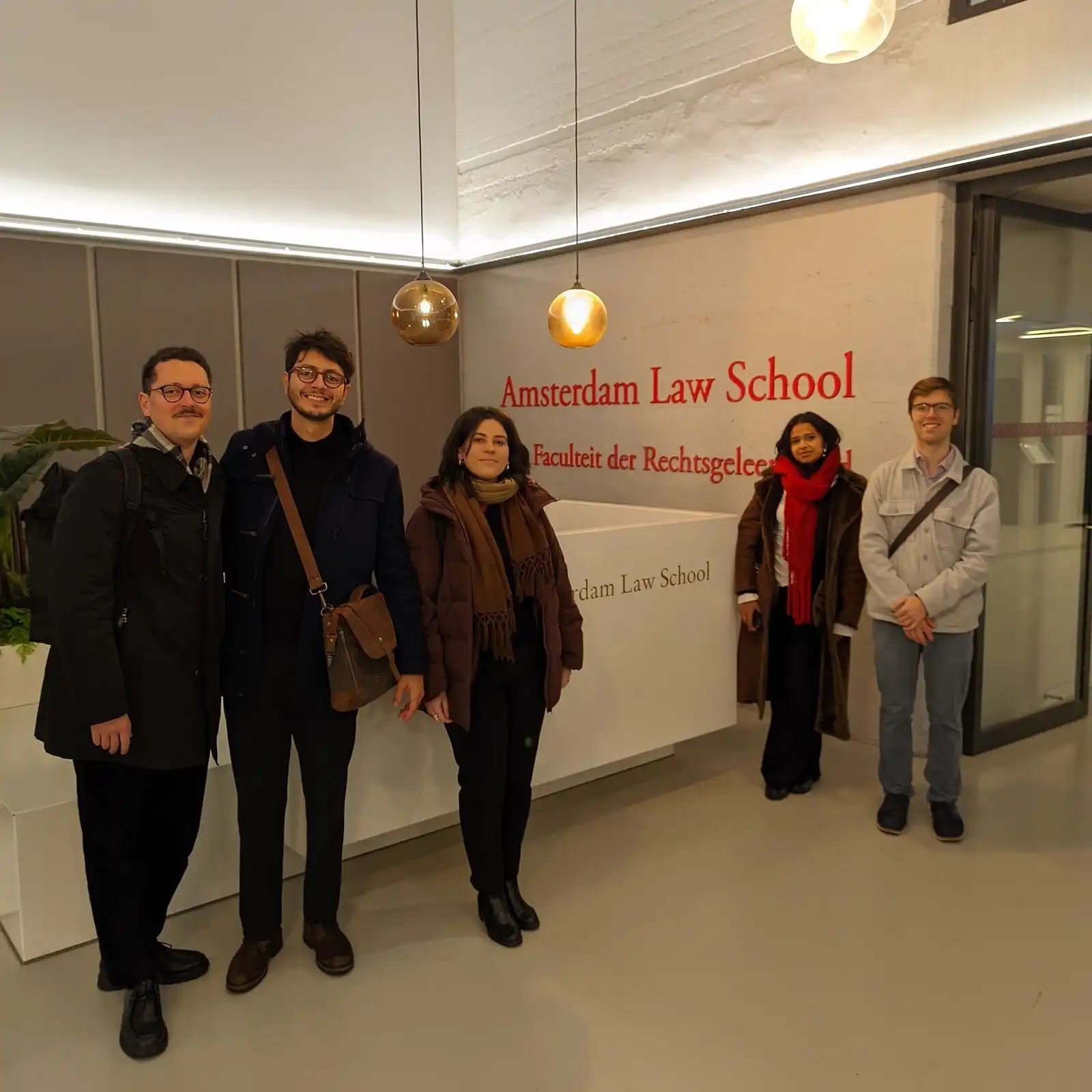Home>Advancing information transparency: DIGILAW clinic programme and IViR examine public access to harmonized standards
21.02.2025
Advancing information transparency: DIGILAW clinic programme and IViR examine public access to harmonized standards

On 11th February 2025, students from DIGILAW clinic programme participated in a research exchange at the Institute for Information Law (IViR) at the University of Amsterdam, engaging in a comparative legal analysis on public access to harmonized safety standards within the European regulatory framework. This meeting, hosted at IViR’s Documentation Centre, served as a platform for a substantive discussion on the legal and administrative barriers affecting transparency and public access in standardization processes. The event brought together students and faculty from both institutions, as well as external experts, in an effort to assess the legal foundations of restricted access to harmonized standards and explore potential avenues for reform.
The Sciences Po delegation, represented by law clinic students Erla Maranaku, Logan Pecht, Lenora Dsouza, Lyobomir Nikiforov (Tutor) and Lucas Anjos (Coordinator), outlined the findings of their ongoing research concerning legal constraints on public access to harmonized standards in France. Their work examined the interaction between access to information laws, European Court of Justice jurisprudence, and national administrative practices, with a particular focus on the legal justifications invoked by French authorities in restricting free access to such standards. Following this, the IViR team, coordinated by Prof. João Pedro Quintais, provided insights into the Dutch legal framework governing administrative transparency, facilitating a comparative discussion on the differing approaches adopted by national authorities in the European Union.
DIGILAW’s research on public access to harmonized standards

The DIGILAW presentation was centered on an investigation into the practical application of legal provisions concerning access to public documents, specifically those governing the disclosure of harmonized standards referenced in EU legislation. The students’ research has been developed in collaboration with Public.Resource.Org, a nonprofit organization advocating for open access to legal and regulatory materials. Their work took inspiration from ECJ Case C-588/21 P, a landmark ruling recognizing an overriding public interest in the accessibility of harmonized standards, grounded in principles of transparency, good governance, and the rule of law.
In pursuit of an empirical analysis, the team has been submitting a series of formal access requests to French administrative bodies, invoking the Code des Relations Entre le Public et l’Administration (CRPA) and relevant EU access to information regulations. The responses—or, in many cases, the absence thereof—revealed systemic challenges in obtaining access to these documents. The majority of administrative bodies either redirected requests to AFNOR, the French standardization organization, or refused to disclose the standards, citing prior case law that deems harmonized standards to be publicly available solely through paid access mechanisms and 16 physical consultation rooms across France. Several authorities failed to acknowledge the requests entirely, amounting to tacit refusals under French administrative law.
Comparative perspectives from IViR’s ILP Lab
The comparative dimension of the discussion identified structural differences in how France and the Netherlands regulate access to administrative documents. IViR’s ILP Lab presented a parallel embrionary analysis of Dutch legal provisions, highlighting procedural aspects of freedom of information requests, government accountability, and the treatment of regulatory standards as public documents. The exchange underscored divergent approaches to administrative access to harmonized standards within the EU, raising broader questions regarding legal standardization and the role of national discretion in implementing transparency mandates.
One of the salient points emerging from the discussion was the tension between intellectual property (copyright) claims over technical standards and the fundamental right to access regulatory information, a conflict that remains unresolved at the European level despite judicial interventions. The Sciences Po team’s findings provided concrete evidence of administrative opacity and procedural barriers that persist despite the ECJ’s recognition of a public interest in disclosure. The Dutch perspective offered by IViR illuminated alternative legal mechanisms that could potentially inform future advocacy strategies.
Future prospects and legal implications
The next phase of the Public.Resource.Org project could focus on the administrative appeal submitted to the Commission on Access to Administrative Documents (CADA), challenging the legality of the refusals issued by French authorities, but this will be for the project partner to take on. The outcome of this proceeding may set an important precedent for subsequent claims concerning the enforceability of access obligations in the field of standardization. In parallel, the team is exploring the development of how-to guide, with legal and policy avenues to further the cause of open access to harmonized standards.
This initiative highlights the broader significance of regulatory access to information in the European legal order, particularly in an era where technical standards increasingly shape market access, consumer safety, and industrial (technological) compliance. By critically assessing the intersection of administrative law, EU governance, and fundamental rights, the DIGILAW clinic programme contributes to the ongoing debate surrounding the democratization of legal and regulatory knowledge. The collaboration with IViR has certainly reinforced the importance of comparative legal methodologies in addressing transnational legal challenges in the EU.
Information Sessions: Masters

Find out more about the Masters programs and the wide choice of specialisations offered by the 8 Schools of Sciences Po during our webinars dedicated to applicants.